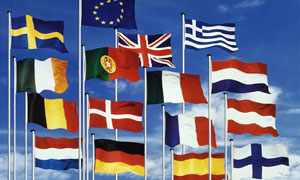Blokkade dreigt bij Europese innovatie

Businesses demand it. 25 EU members want it. The Hungarian EUpresidency pushes it forward. Spain and Italy try to stop it.
Last March, the EU ministers of industry and competitivenessnegotiated in Brussels over the creation of a unified EU patentsystem. 25 of the 27 EU members support such a measure alongsidethe creation of a European Community Patent Court. EspeciallyHungary, the current incumbent of the EU Presidency, urges thebenefits of such a system, estimating cost savings to Europeanbusinesses up to €750 million per year.
“We worden gedsicrimineerd”
Italy and Spain, however, feel that in the current proposal theyare being “discriminated against for reasons of language” accordingto Spain’s EU affairs minister, Diego Lopez Garrido. Main issue:all future patent applications are to be done in one of threeworking languages, English, French or German. This would putItalian and Spanish businesses at a significant disadvantage, thesecountries claim. Other EU members did not see this problem asdramatic even though only 3 out of the current 23 EU languages areto become ‘main working languages’.
Despite Italy and Spain stalling a EU wide solution, the other25 members move ahead to create a ‘unitary patent title’. This ispossible due to the implementation of an ‘Enhanced Cooperation’covenant in the EU treaty from 1999. This piece of legislationallows groups of EU members to advance further on integrationissues when a EU wide consensus cannot be found. Italy and Spainnow have filed a complaint with the European Court of Justice,calling the Enhanced Cooperation move of the other members “adiscriminatory divisive instrument”.
Nog meer obstakels in het EU recht?
At present, a firm applying for a patent files its applicationwith the European Patent Office (EPO) to receive a ‘Europeanpatent’. Such a patent is, however, not valid for all Europeanmarkets. To have patent protection in multiple countries,businesses have to apply for each country individually. A newEuropean Patent System would solve this problem, but anotherlegislative hurdle might threaten its creation.
At the beginning of March, the European Court of Justice ruledthat establishing a new entity deciding over EU patent disputescould not be created under current EU laws. Such a EuropeanCommunity Patent Court would be a completely new institution. Theexisting EPO only facilitates EU patent applications, while patentdisputes now have to be dealt with separately by courts in eachindividual EU-member state.
Whether, how and when these issues will be resolved is not clearyet. But the next crucial step is approaches: on the 27 June, allEU ministers of industry and competiveness are scheduled to meet inLuxembourg. Main point on the agenda: how to create a single EUpatent system.
Dutch innovation and industry minister Maxime Verhagen was madefor such situations. As Foreign Minister he kept pushing hisMinister colleagues so fiercely, that they finally agreed topressure the Serbian government into searching for war criminalgeneral Mladic. Now, he is in jail in the Netherlands, waiting forhis trial at the International Criminal Tribunal for the formerYugoslavia.
Meest Gelezen
Vrouwen houden universiteit draaiende, maar krijgen daarvoor geen waardering
Wederom intimidatie van journalisten door universiteit, nu in Delft
Hbo-docent wil wel rolmodel zijn, maar niet eigen moreel kompas opdringen
‘Burgerschapsonderwijs moet ook verplicht worden in hbo en wo’
Raad van State: laat taaltoets nog niet gelden voor hbo-opleidingen



